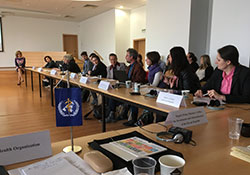Better future: Health for all, all for health

WHO
In September 2015, heads of state and government adopted the 2030 Agenda for Sustainable Development and its Sustainable Development Goals (SDGs). The United Nations emphasizes that everyone needs to play their part if the SDGs are to be reached: governments, the private sector and civil society. The 17 SDGs and their 169 associated targets are global in nature, universally applicable and interlinked. Health has a central place as a major contributor and beneficiary of sustainable development policies. SDG 3, “Health and well-being for all”, is strengthened by the 13 health targets, and additional health-related targets are set out under other goals.
WHO’s role in the implementation of the SDGs is to support countries in their work towards implementing the health-related goals and targets. WHO European Region Member States are in a strong and unique position to effectively implement the 2030 Agenda as many of its principles and elements are also central to the Health 2020 policy framework, meaning that much of the necessary work has already started.
On 9 May 2017, the WHO Regional Office for Europe, at the request of the Slovak Ministry of Health, organized a seminar in Bratislava with the objective of explaining the health components of the 2030 Agenda and discussing how countries can best achieve health and well-being for all. The subregional meeting included participants from Czechia, Hungary, Poland and Slovakia and representatives from ministries of health, public health institutes, other relevant sectors (such as environment, social affairs and education), academia and nongovernmental organizations.
In her opening address, Dr Darina Sedlakova, acting head of the WHO Country Office in Slovakia, said that Agenda 2030 is a plan of action for people and for our planet, ensuring that no one will be left behind. Member States are expected to act through legislation and other initiatives on public health, health systems and environment-related health problems. Health is important for people's individual well-being and for shaping a sustainable economy and prosperity. Caring for health is the responsibility of the whole of society, and of the whole government.
Dr Betinna Menne, WHO European Region coordinator for health and development, gave a comprehensive overview of the process of adoption of the SDGs, and delivered presentations on the health and well-being aspects of the 2030 Agenda and the roadmap for implementing the SDGs that is currently being developed by the Regional Office. She also facilitated roundtable discussions on how the represented countries positioned the SDGs in their national policies and strategies, with special focus on SDG 3. The group exercise dealt with how to best ensure policy coherence and multisectoral action, and how to monitor progress. Participants exchanged views on how their countries plan to achieve the set targets, the opportunities and barriers, and how to tackle them. They recalled that the SDGs are owned by every country and provide a blueprint for responding to economic, social and environmental challenges. Participants expressed willingness to organize a follow-up seminar with more focused work on SDG 3 and its targets, which will further strengthen their knowledge and skills in achieving them.



